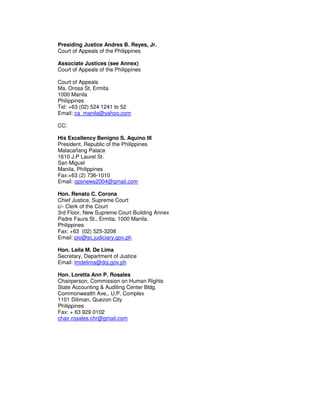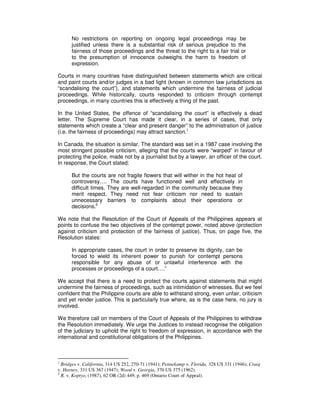Letter of 38 organizations to the Court of Appeals
- 1. Presiding Justice Andres B. Reyes, Jr. Court of Appeals of the Philippines Associate Justices (see Annex) Court of Appeals of the Philippines Court of Appeals Ma. Orosa St, Ermita 1000 Manila Philippines Tel: +63 (02) 524 1241 to 52 Email: ca_manila@yahoo.com CC: His Excellency Benigno S. Aquino III President, Republic of the Philippines Malacañang Palace 1610 J.P Laurel St. San Miguel Manila, Philippines Fax:+63 (2) 736-1010 Email: opsnews2004@gmail.com Hon. Renato C. Corona Chief Justice, Supreme Court c/- Clerk of the Court 3rd Floor, New Supreme Court Building Annex Padre Faura St., Ermita, 1000 Manila. Philippines Fax: +63 (02) 525-3208 Email: pio@sc.judiciary.gov.ph Hon. Leila M. De Lima Secretary, Department of Justice Email: lmdelima@doj.gov.ph Hon. Loretta Ann P. Rosales Chairperson, Commission on Human Rights State Accounting & Auditing Center Bldg. Commonwealth Ave., U.P. Complex 1101 Diliman, Quezon City Philippines Fax: + 63 929 0102 chair.rosales.chr@gmail.com
- 2. June 2, 2011 Dear Justice Reyes and Associate Justices, RE: Freedom of Expression and Justice in the Ampatuan Massacre Trials We the undersigned members and partners of the International Freedom of Expression Exchange (IFEX) are writing to express our deep concerns about the 12 April 2011 Resolution of the Court of Appeals of the Philippines, Manila Special Division of Five, requiring Monette Salaysay and Rowena Paraan to explain why they should not be held in contempt for comments attributed to them in an article in the Philippine Daily Inquirer regarding the Ampatuan Town Massacre trials. The Resolution against Salaysay, whose husband Napoleon Salaysay was among 32 journalists and media workers murdered in the massacre of 58 people on 23 November 2009, and Paraan, the General Secretary of the National Union of Journalists of the Philippines (NUJP), leaves both women at risk of a jail term and financial punishment. It remains unclear whether the petition was initiated by defence lawyers or independently by five justices of the Court of Appeals. We note however that the resolution is remarkably similar in argument and tone to a paid advertisement which had been placed in national dailies by the accused, Zaldy Ampatuan, whose case gave rise to the statements which are the subject of the Resolution. The Resolution accuses Salaysay and Paraan of “foisting bias and corruption upon the members of the court” through their statements. In substance, the statements attributed to Salaysay and Paraan noted that although Associate Justices Danton Bueser and Marlene Gonzales-Sison recused themselves in the case of Andal Ampatuan Senior, they did not do so in the case of Zaldy Ampatuan. The statements questioned this apparent inconsistency. As we gather in Lebanon for the bi-annual conference of IFEX, the international community of freedom of expression and press freedom defenders, we are alarmed at the chilling effect of the contempt Resolution, along with separate contempt claims against several prosecutors. We note that the right to freedom of expression, as protected by Article 19 of the International Covenant on Civil and Political Rights (ICCPR) and of the Universal Declaration of Human Rights, and by the Constitution of the Philippines, imposes strict limits on the ability of courts to restrict freedom of expression to protect the administration of justice. As the (then) three special international mandates on freedom of expression – the United Nations Special Rapporteur on Freedom of Opinion and Expression, the Organisation for Security and Cooperation in Europe (OSCE) Representative on Freedom of the Media, and the Organisation of American States (OAS) Special Rapporteur on Freedom of Expression – stated in a Joint Declaration of 10 December 2002: Special restrictions on commenting on courts and judges cannot be justified; the judiciary play a key public role and, as such, must be subject to open public scrutiny.
- 3. No restrictions on reporting on ongoing legal proceedings may be justified unless there is a substantial risk of serious prejudice to the fairness of those proceedings and the threat to the right to a fair trial or to the presumption of innocence outweighs the harm to freedom of expression. Courts in many countries have distinguished between statements which are critical and paint courts and/or judges in a bad light (known in common law jurisdictions as “scandalising the court”), and statements which undermine the fairness of judicial proceedings. While historically, courts responded to criticism through contempt proceedings, in many countries this is effectively a thing of the past. In the United States, the offence of “scandalising the court” is effectively a dead letter. The Supreme Court has made it clear, in a series of cases, that only statements which create a “clear and present danger” to the administration of justice (i.e. the fairness of proceedings) may attract sanction.1 In Canada, the situation is similar. The standard was set in a 1987 case involving the most stringent possible criticism, alleging that the courts were “warped” in favour of protecting the police, made not by a journalist but by a lawyer, an officer of the court. In response, the Court stated: But the courts are not fragile flowers that will wither in the hot heat of controversy…. The courts have functioned well and effectively in difficult times. They are well-regarded in the community because they merit respect. They need not fear criticism nor need to sustain unnecessary barriers to complaints about their operations or decisions.2 We note that the Resolution of the Court of Appeals of the Philippines appears at points to confuse the two objectives of the contempt power, noted above (protection against criticism and protection of the fairness of justice). Thus, on page five, the Resolution states: In appropriate cases, the court in order to preserve its dignity, can be forced to wield its inherent power to punish for contempt persons responsible for any abuse of or unlawful interference with the processes or proceedings of a court….” We accept that there is a need to protect the courts against statements that might undermine the fairness of proceedings, such as intimidation of witnesses. But we feel confident that the Philippine courts are able to withstand strong, even unfair, criticism and yet render justice. This is particularly true where, as is the case here, no jury is involved. We therefore call on members of the Court of Appeals of the Philippines to withdraw the Resolution immediately. We urge the Justices to instead recognise the obligation of the judiciary to uphold the right to freedom of expression, in accordance with the international and constitutional obligations of the Philippines. 1 Bridges v. California, 314 US 252, 270-71 (1941); Pennekamp v. Florida, 328 US 331 (1946); Craig v. Harney, 331 US 367 (1947); Wood v. Georgia, 370 US 375 (1962). 2 R. v. Koptyo, (1987), 62 OR (2d) 449, p. 469 (Ontario Court of Appeal).
- 4. Like many members of the broader Philippine public, we are distressed by the manner in which hearings into the massacre continue to be vexed by stalling tactics and unacceptable delays and distractions in prosecuting the accused on charges related to the murders of 57 of the 58 victims of 23 November 2009. More than 18 months since the massacre horrified the world, it is imperative that the judiciary and courts of the Philippines ensure that the focus of judicial actions is the prosecution of all those responsible for ordering and undertaking this horrendous crime, rather than permitting continued distractions. Meanwhile, we continue to stand firmly with the families of the victims and with our colleagues in the Philippines in their honourable quest for justice and defence of the right of all peoples to speak out on matters of grave public importance. Yours Respectfully, 1. Centre for Law and Democracy 2. International Federation of Journalists (IFJ) 3. National Union of Journalists of the Philippines (NUJP) 4. Aliansi Jurnalis Independen (Alliance of Independent Journalists) 5. Arabic Network for Human Rights Information 6. ARTICLE 19: Global Campaign for Free Expression 7. Association of Caribbean Media Workers 8. Cambodian Center for Human Rights 9. Canadian Journalists for Free Expression 10. Center for Journalism in Extreme Situations 11. Center for Media Freedom and Responsibility 12. Center for Media Studies & Peace Building 13. Centre for Independent Journalism 14. Centro de Reportes Informativos sobre Guatemala 15. Egyptian Organization for Human Rights 16. Foundation for Press Freedom 17. Freedom Forum 18. Freedom House 19. Free Media Movement 20. Globe International 21. Hong Kong Journalists Association 22. Independent Journalism Center 23. Index on Censorship 24. IPS Communication Foundation 25. Maharat Foundation (Skills Foundation) 26. Media, Entertainment and Arts Alliance 27. Media Foundation for West Africa 28. Media Institute of Southern Africa 29. Media Rights Agenda 30. Media Watch 31. Mizzima News 32. National Union of Somali Journalists 33. Norwegian PEN 34. Observatoire pour la liberté de presse, d'édition et de création 35. Pacific Islands News Association 36. Pakistan Press Foundation 37. Southeast Asian Press Alliance 38. South East European Network for the Professionalization of the Media
- 5. ANNEX Associate Justices - Court of Appeals of the Philippines Associate Justice Portia Aliño Hormachuelos Associate Justice Remedios Salazar Fernando Associate Justice Bienvenido L. Reyes Associate Justice Josefina Guevara Salonga Associate Justice Rebecca De Guia Salvador Associate Justice Juan Q. Enriques, JR. Associate Justice Amelita G. Tolentino Associate Justice Mario L. Guariña III Associate Justice Rosmari D. Carandang Associate Justice Hakim S. Abdulwahid Associate Justice Noel G. Tijam Associate Justice Rosalinda Asuncion Vicente Associate Justice Jose C. Reyes, JR. Associate Justice Fernanda Lampas Peralta Associate Justice Magdangal M. De Leon Associate Justice Vicente S. E. Veloso Associate Justice Isaias P. Dicdican Associate Justice Japar B. Dimaampao Associate Justice Celia C. Librea- Leagogo Associate Justice Pampio A. Abarintos Associate Justice Estela M. Perlas- Bernabe Associate Justice Mariflor Punzalan Castillo Associate Justice Sesinando E. Villon Associate Justice Ramon M. Bato, Jr. Associate Justice Romulo V. Borja Associate Justice Edgardo A. Camello Associate Justice Rodrigo F. Lim, Jr. Associate Justice Normandie B. Pizarro Associate Justice Apolinario D. Bruselas, Jr. Associate Justice Ramon R. Garcia Associate Justice Ricardo R. Rosario Associate Justice Francisco P. Acosta Associate Justice Stephen C. Cruz Associate Justice Jane Aurora C. Lantion Associate Justice Michale P. Elbinias Associate Justice Elihu A. Ybañez Associate Justice Franchito N. Diamante Associate Justice Amy C. Lazaro- Javier Associate Justice Rodil V. Zalameda Associate Justice Florito S. Macalino Associate Justice Edgardo T. Lloren Associate Justice Edgardo L. Delos Santos Associate Justice Manuel M. Barrios Associate Justice Samuel H. Gaerlan Associate Justice Danton Q. Bueser Associate Justice Leoncia R. Dimagiba Associate Justice Edwin D. Sorongon Associate Justice Ramon A. Cruz Associate Justice Agnes R. Carpio Associate Justice Socorro B. Inting Associate Justice Angelita A. Gacutan
- 6. Associate Justice Myra G. Fernandez Associate Justice Eduardo B. Peralta, Jr. Associate Justice Ramon Paul L. Hernando Associate Justice Nina G. Antonio- Valenzuela Associate Justice Gabriel T. Ingles Associate Justice Victoria Isabel A. Paredes Associate Justice Abraham B. Borreta Associate Justice Pamela Ann Abella Maxino Associate Justice Carmelita Salandanan Manahan Associate Justice Melchor Quirino C. Sadang Associate Justice Zenaida T. Galapate Laguilles






